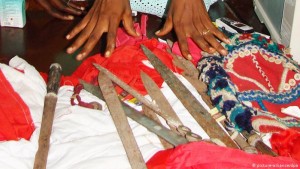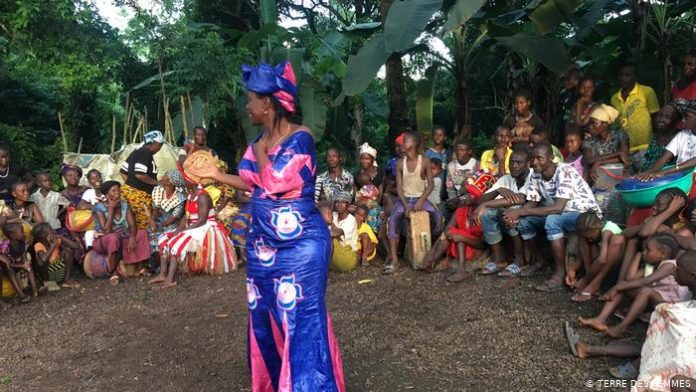By Mary Kabay
Female Genital Mutilation is tradition that has been embedded in the Sierra Leonean cultural way of life for quite a considerable period of time but because of mounting campaigns by certain activists this traditional practice is somehow declining in most communities within the country.
One person who has been commended for enhancing the campaign and taking it to another level is, Rugiatu Neneh Turay, who has been and still continues to be vociferous in terms of changing the mindsets of those who believe that FGM should be a must and not challenged.
In one of her campaign drives, Rugiatu Turay, sets up the film screen and projector in the dusty meeting center of Magbanabon village about 40 kilometers (25 miles) from Matotoka Town in the north of Sierra Leone.
She was there to screen a documentary about female genital mutilation (FGM), commonly known as “cutting” or Bondo in the region.
As night falls, around a hundred men, women and children from the village seat themselves for the screening under the community center’s thatched roof.
Many in the audience scream in shock at a scene detailing the cutting, which is normally done without anesthetic using knives, razor blades or even pieces of glass.
Sierra Leone has one of the highest rates of FGM in Africa. According to UNICEF figures from 2017, the practice has been performed on an estimated 86% of women and girls in the country. FGM involves the partial or total removal of the female genital organs, such as the clitoris or labia.
Besides severe bleeding, FGM can cause a variety of health issues from infections and cysts to infertility and complications in childbirth.
Among those in Magbanabon watching the documentary were ‘Soweis’, elderly women who carry out the circumcision as part of girls’ initiation into the Bondo society, a secret women’s society with an entrenched role in the county’s tribal and political life.
Some Soweis scream at the cutting scene, others look away, placing their heads in their hands to avoid the graphic footage.
After the screening, Turay sounded out the community’s views on what they had seen and offered men and women the opportunity to ask questions and discuss the way forward.
Turay is one of Sierra Leone’s most well-known anti-FGM campaigners. She founded the grassroots anti-FGM group, the Amazonian Initiative Movement in 2002, is a former Deputy Minister of Social Welfare, Gender and Children’s Affairs and in 2020 won a German human rights prize, the Theodor Haecker award, for her work.
Above all, she has a reputation for talking to all of those involved in cutting, including the Soweis, parents, girls and village chiefs.
“One of the things you always have to do as a campaigner is to make sure you are honest to yourself, speak frankly and give respect to people,” Turay intimated. “You can see that they look at me as any one of them. I behave like them.”
Magbanabon Town Chief PaKapri Kargbo, who attended the documentary screening, said he appreciates Turay’s message.
“She didn’t threaten us,” he said instead she “simply explained what we didn’t know in the past.”
But he questioned what comes next for the Soweis, who depend on the ritual cutting for their livelihoods.
Girls’ families supply the Soweis with food, clothing, cloth, jewelry and money during the initiation period and still give them occasional gifts long after that.
“If our people eventually agree with her ideas, what would the repercussion be or what would be done for the Soweis?” Kargbo asked.
Turay is keenly aware that fighting FGM also means finding alternative sources of income for the S oweis.
Later in the week, Turay meets with a group of Soweis who have promised to stop practicing FGM during a special Bondo initiation she organized in 2019 that didn’t involve any cutting.
The Bondo initiation rituals, which confer womanhood on girls, often occur in isolated forested areas referred to as a Bondo bush. As well as being cut, young girls are taught ritual dances and chants and how to confront spirits, as well as learning how to do domestic chores and be prepared for a husband.
“Now that I have experienced Turay’s campaign and the effects it is having on me and my peers, there’s no reason to return to our old habits,” one of the Soweis said. “Some of us are now training in tailoring [through Turay’s organization] and I consider that more beneficial than what we were engaged in.”
To break to cycle of FGM, Turay wants to create alternative Bondo rituals to cutting.
“The challenge is to eliminate female genital mutilation but not the Bondo culture, which plays an important role in society,” Turay intimated.
Around 100 girls took part in Turay’s first “No Blade, No Blood, No Pain” Bondo. One of them was Ramatu S. Bangura, who was 19 at the time.
Bangura had previously refused to take part in the Bondo bush because she didn’t want to endure FGM. This led to enormous teasing from her friends at school and in her community for not being an initiate, she said.
But she jumped at the chance to be part of Turay’s special Bondo, “because they are not dealing with blood.”
“The same people who used to mock at me now think that we are the same because I’m now a member of the Bondo society.”
Aminata M. Kamara, who lives in the Port Loko District in Sierra Leone’s north, also took part. She is outspoken in what she sees as the advantages of not having endured FGM.
“Most of our female parents went through that society,” she explained. “Some of them weren’t able to give birth anymore. Some of their husbands left them because they were not able to enjoy their sex life anymore, because they had removed their clitoris.”
“Any man that I have sex with, that man will really enjoy me. And as time goes on, when I get my own pregnancy, I’ll be able to give birth easily.”





